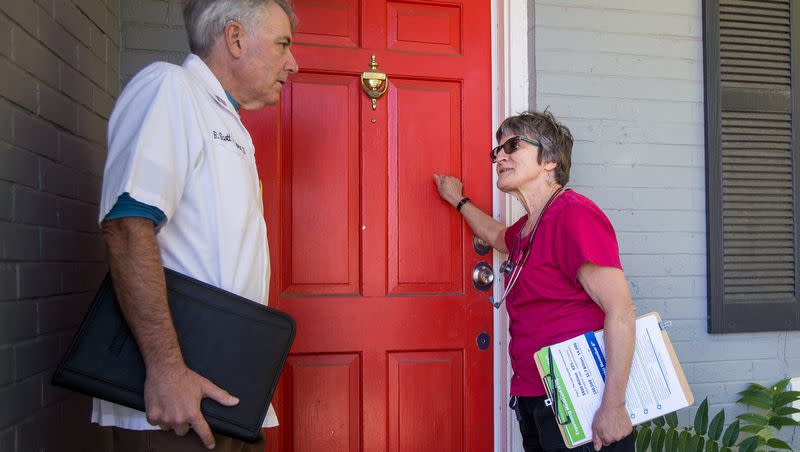Will Utah voters be asked to decide whether to increase the threshold for passing initiatives that raise taxes?

The Utah House passed legislation Thursday that would put a constitutional amendment on the November ballot to raise the threshold to 60% of voters’ approval for passing an initiative raising taxes, but it’s not clear how the measures will fare in the Senate.
“This is about taxes,” Rep, Jason Kyle, R-Huntsville, sponsor of both HB284, and a resolution putting the amendment on the ballot, HJR14, said before each passed the House on a vote of 54-20, with six Republicans joining the Democratic minority in opposition.
“It’s really important that we treat our tax dollars like they’re not our money because they are not,” Kyle said. “When we’re voting on these things, they’re other people’s money and it should be difficult to raise taxes.”
Related
One of the GOP’s “no” votes, Rep. Ray Ward, R-Bountiful, pointed out the 2018 Medicaid expansion initiative approved by voters would have failed had the threshold been in effect because it included a sales tax increase.
Ward said the tax increase was part of the initiative because backers were being responsible, ensuring there would “enough money to afford it and planned ahead instead of having it be an unfunded mandate.”
He said the majority of initiatives that have won at the ballot box did so with less than a 60% majority, so imposing that requirement on those that raise taxes to pay for new or expanded government programs would be “impossible” to pass.
House Minority Whip Jen Dailey-Provost, D-Salt Lake City, said it is “anathema” for lawmakers to hold what she called an engaged public to a higher standard. It only takes a simple majority to pass a tax increase in the Utah Legislature.
But Rep. Brady Brammer, R-Pleasant Grove, said the governor’s power “to veto an idea he knows is bad” in an important distinction between lawmakers’ actions and initiatives put on the ballot by the public.
Brammer said the proposed constitutional amendment provides “some level of check” by letting the public choose whether or not they want to put a higher threshold for passing initiatives that raise taxes.
Another supporter of raising the vote threshold, House Majority Assistant Whip Casey Snider, R-Paradise, said rural parts of the state usually vote against initiatives, often to see them pass anyway.
Rural Utahns end up believing they are “not ruled by our elected officials but by the Wasatch Front,” Snider said, adding that a higher threshold would make them “feel represented.”
After the legislation passed a House committee recently, the “Let Utah Vote” coalition that’s described as “dedicated to protecting and progressing the right to vote in Utah” held a news conference at the Capitol to rally Utahns against the threshold change.
The bill and the resolution now go to the Senate, where they may not be all that welcome.
Senate Majority Leader Evan Vickers, R-Cedar City, said with several constitutional amendments already set for this year’s general election ballot and more being discussed this session, it might not be the time to add another.
“You start getting too many then it really muddies the field when a voter goes to the polls. So we’re concerned about that, and potentially them just automatically saying no to everything,” Vickers told reporters during the Senate’s daily media availability.
Related
That would be a big blow to the Legislature’s hopes of amending the Utah Constitution to lift the earmark on state income tax revenues for education and some social services programs.
Getting rid of the restrictions on spending the state’s largest revenue source is so important to lawmakers that last session, they agreed to remove the state sales tax from food if the constitutional amendment on how income taxes can be used passes in November.
Vickers said the Senate, where Republicans also hold a supermajority, will deal with the threshold changes along with other proposed constitutional amendments. But the impact if lawmakers “clutter up the ballot” has to be considered, he said.
“There’s a dynamic going on,” Senate President Stuart Adams, R-Layton said. “We’re going to evaluate closely.”

